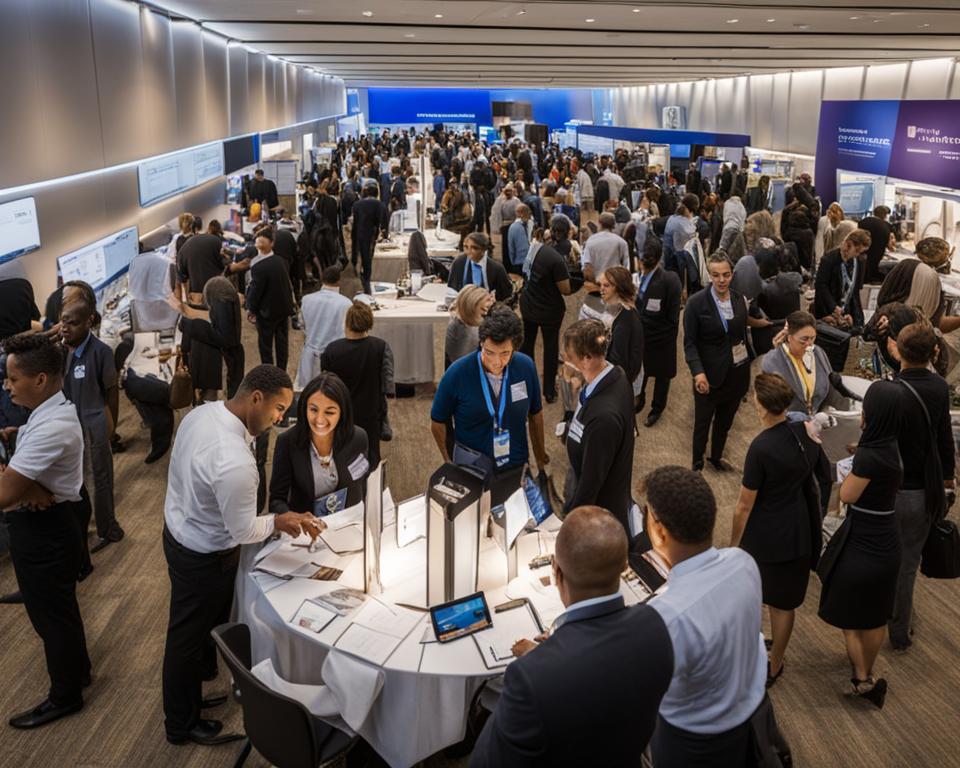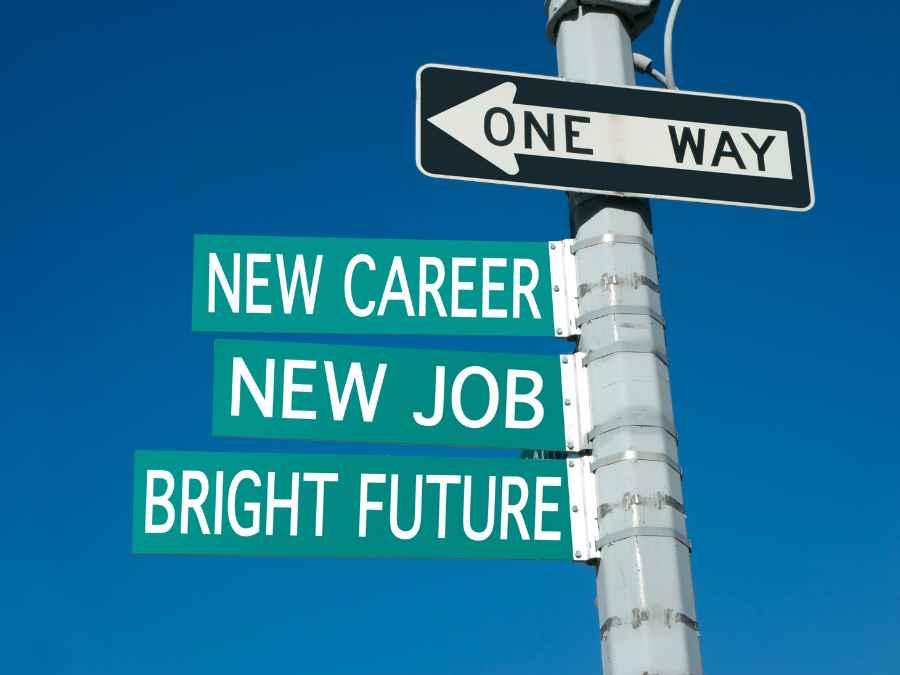In today’s competitive job market, it can be challenging to stand out from other job seekers. However, attending career fairs can be a valuable tool for unlocking job opportunities and expanding your professional network. Career fairs offer a unique opportunity to connect with employers face-to-face, learn about different industries and companies, and potentially secure a new job.
Networking is a critical aspect of career fairs. Meeting employers and other professionals can help you gain valuable insights and potentially lead to mentorship or sponsorship opportunities. Additionally, attending industry-specific career fairs can provide deeper insights into a specific industry and lead to potential job offers.
In this article, we will explore the value of career fairs, how they function, and provide strategies to prepare and make the most of these valuable events.
Key Takeaways:
- Career fairs provide direct access to employers and offer opportunities for face-to-face interactions.
- Attending industry-specific career fairs offers deeper insights into a specific industry.
- Networking is a critical aspect of career fairs and can lead to mentorship or sponsorship opportunities.
- Proper preparation is essential for making a lasting impression at career fairs.
- Maximizing follow-up opportunities after attending a career fair is crucial.
What are Career Fairs?
Career fairs are events that bring together employers and job seekers with the aim of networking and exploring potential job opportunities. They are typically hosted by colleges, universities, or professional organizations and provide an opportunity for job seekers to meet with recruiters, learn about different companies and industries, and potentially secure interviews for job openings.
At a career fair, companies typically have booths or tables set up where they can showcase their company and available job opportunities. Job seekers can visit each booth and engage in conversations with recruiters, providing an opportunity to make a strong first impression and learn more about the specific requirements and qualifications for each job opening.
Career fairs are usually held in large venues, such as convention centers or stadiums, and attract a diverse group of attendees. These events are great for students, recent graduates, and professionals looking to make a career change or explore new opportunities within their industry.
Attending a career fair can be an excellent way to kickstart your job search, meet new people, and expand your professional network.
Benefits of Attending Career Fairs
Attending a career fair can provide numerous benefits for job seekers. Firstly, it provides direct access to potential employers who are actively seeking new hires. This exposes you to a wide range of job opportunities that you may have not discovered through other channels.
Secondly, career fairs offer a unique opportunity for face-to-face interactions with recruiters and hiring managers. This personal connection can help you stand out from other applicants and make a lasting impression on potential employers.
Furthermore, attending career fairs can allow job seekers to learn about different industries and companies they may be interested in. This can help them tailor their job search and gain a better understanding of what potential employers are looking for in candidates.
Finally, career fairs provide a platform for networking with professionals in diverse industries, expanding your professional network and potentially leading to future career opportunities. Thus, attending career fairs is an essential tool for job seekers looking to unlock job opportunities and expand their professional circle.
Unlocking Job Opportunities
Career fairs provide job seekers with a valuable opportunity to unlock a wide range of job opportunities. With multiple companies and industries represented, attendees can explore a variety of job openings in one convenient location. Companies attend career fairs to actively recruit new talent, and job seekers can take advantage of this by engaging with potential employers and learning more about the available job opportunities.
By attending career fairs, job seekers can gain insights into different industries and understand the current job market trends. They can also learn about the skills, qualifications, and experience required for different job positions. This information can be valuable when preparing resumes, cover letters, and for job interviews in the future. Visiting a career fair can be an excellent way to discover unadvertised positions, or find companies that match one’s interests.
Expanding Your Professional Network
Attending career fairs not only provides access to job opportunities, but it also offers an excellent opportunity to expand your professional network. By interacting with professionals in your desired industries, you can gain valuable advice and insights, and potentially, make contacts. Networking at career fairs can help to open doors to new opportunities in the future, even if they are not available at the time of the event.
Expanding your professional network can also help you become more informed about different industries and specific companies, including their culture, values, and work environments. Networking with professionals who have experience in your desired field can help you gain insights that will help in making informed career decisions.
Building relationships at career fairs can be a game-changer for your career. The key to successfully expanding your network is to be proactive, engaging, and respectful, by taking an interest in potential employer’s interests, making a positive impression, and keeping in touch with them in the long run.
How to Prepare for a Career Fair
Attending a career fair can be a game-changer in your job search and professional networking. To make the most out of it, adequate preparation is key. Here are some tips to help you prepare:
Research Participating Companies
Gain insight into the companies attending the career fair. Make a list of the top ones you want to visit, and research their missions, values, and available job positions. This knowledge will enable you to select and approach the right companies that match your career goals.
Update Your Resume and LinkedIn Profile
Update your resume and LinkedIn profile to showcase your best work experience and skills. Ensure that they align with the companies and job positions you’re targeting. Make sure that your contact information is accurate and up-to-date.
Practice Your Elevator Pitch
An elevator pitch is a brief introduction of yourself, highlighting your skills, expertise, and career aspirations. Practice delivering an elevator pitch that is authentic, clear, and concise. You want to come across as confident, and articulate during hiring managers’ first impressions.
Dress Professionally
First impressions matter, and it counts during career fairs. Dress professionally and appropriately for the job positions or company cultures you’re targeting. Keep it simple, neat, and polished.
Bring Necessary Materials
Carry copies of your resume, business cards, pens, notepad, and a portfolio of your work samples. Ensure that they are neat and presentable. Some companies may ask for these documents on the spot, and it saves you time to have them.
Network Strategically
Make the most of the opportunity to connect with professionals and hiring managers. Be approachable, friendly, and engaging. Introduce yourself, ask questions, and exchange contacts. Don’t forget to follow-up after the career fair. Send thank you notes to those you met, and keep in touch with valuable contacts.
Making a Lasting Impression at Career Fairs
To stand out from the crowd and make a lasting impression at career fairs, it’s crucial to exhibit confidence and professionalism. Dress appropriately, research the companies attending, and come prepared with questions and talking points. Engage in meaningful conversations with potential employers, share your experiences and career goals, and demonstrate a genuine interest in their organization.
Remember to exchange contact information and express your appreciation for their time and insight. Follow up with a thank-you email or message, expressing your continued interest and reiterating your qualifications. Making a positive impression can lead to networking opportunities and potentially even job offers.
“The impression you make on others is the most valuable currency you have.” – Jim Rohn
Maximizing Opportunities After a Career Fair
Attending a career fair can be an excellent way to explore various job opportunities and build meaningful connections with potential employers. However, your efforts should not stop once the event is over. It’s crucial to take proactive steps to maximize the opportunities that emerge from attending a career fair. Here’s what you should do:
Follow up with potential employers
Within a few days after the career fair, follow up with the employers you met at the event. Send an email expressing your appreciation for their time and reiterating your interest in any job openings they may have. This simple gesture can help keep you top of mind when employers review resumes and applications.
Connect with new contacts on professional platforms
Connect with the new contacts you made at the career fair on professional platforms such as LinkedIn. This can help build your network and allow you to keep up-to-date with any new job openings or industry trends. Keep in mind that it’s important to personalize your connection requests by reminding the person how you met and expressing your interest in staying in touch.
Continue to build relationships
Building relationships takes time and effort. Be sure to nurture the connections you made at the career fair by periodically reaching out to them with personalized messages. Let them know what you’re up to and ask them about their latest projects and initiatives. This can help keep the relationship alive and potentially lead to new job opportunities down the line.
By taking these proactive steps, you can maximize the opportunities that come from attending career fairs and increase your chances of landing your dream job.
Industry-Specific Career Fairs
While general career fairs offer a chance to explore a variety of industries, industry-specific career fairs provide a more targeted approach. Job seekers interested in a particular field or industry can benefit from attending these events that focus on specific sectors such as technology, healthcare, or finance.
At industry-specific career fairs, job seekers can connect with employers who are actively hiring in their area of interest. These fairs often have a more specialized employer list, which can offer attendees an advantage in finding relevant job opportunities. Job seekers can also learn about in-demand skills and specialized training programs that can give them a competitive edge in their field.
Attending industry-specific career fairs can offer more than just access to job opportunities. They also serve as a valuable platform for industry professionals to connect and exchange ideas. By attending these fairs, job seekers can gain insights into the latest trends and advancements in their field, as well as expand their network by connecting with industry leaders and peers.
Don’t miss out on the unique opportunities industry-specific career fairs offer. Research and prepare in advance to make the most of your time at the event, and remember to dress appropriately and bring copies of your resume. Industry-specific career fairs can be a highly effective tool for finding job opportunities and building long-lasting relationships in your desired field.
Virtual Career Fairs: The Future of Networking?
The COVID-19 pandemic has accelerated the shift towards virtual events, including career fairs. Virtual career fairs offer job seekers the opportunity to connect with employers and explore job opportunities from the comfort of their own homes.
One major benefit of virtual career fairs is their accessibility. Job seekers no longer have to travel to physical locations, saving them time and money. Additionally, virtual career fairs offer a wider range of job opportunities, as employers from different cities or even countries can participate in the same event.
However, virtual career fairs also present potential challenges. Job seekers may miss out on the face-to-face interactions and personal connections that physical career fairs provide. Technical issues may also arise, disrupting the networking experience.
Despite these challenges, virtual career fairs are becoming increasingly popular. According to Forbes, 92% of recruiters are planning to use virtual career fairs in 2021.
As the world becomes more digitally connected, virtual career fairs have the potential to become a major tool for job seekers in networking and finding job opportunities.






